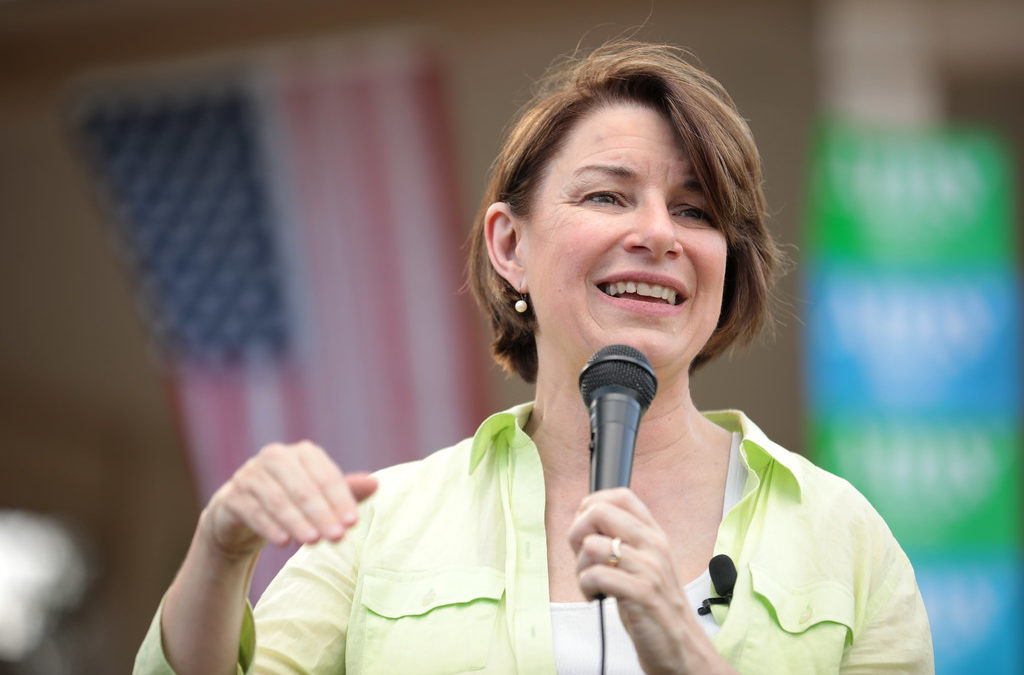Amy Klobuchar ended her presidential campaign and endorsed Joe Biden on Monday, making her the third Democrat in three days to exit the race after Biden’s big win in the South Carolina primary.
Klobuchar dropped out just before her home state, Minnesota, votes on Super Tuesday — paving the way for Biden to capture a greater share of moderate Democratic votes against Bernie Sanders, who gained momentum and took over the delegate lead in the primary after wins in New Hampshire and Nevada last month. Sanders’ surge and Biden’s resurgence also pushed Pete Buttigieg and Tom Steyer from the presidential race over the weekend, amid pressure from top Democrats to consolidate behind a Sanders alternative.
Klobuchar traveled to Dallas on Monday, where she joined the former vice president. At Biden’s rally, Klobuchar announced that she’s suspended her campaign and threw her support to him. She informed Biden’s campaign Monday morning that she was quitting the race and endorsing him, according to a person on a call with campaign staffers in the afternoon.
Klobuchar told staffers about her plans to exit the race and endorse Biden on the call. She thanked them, noting that the campaign outperformed expectations in the 2020 race, according to a person on the call. ““Thanks for being part of this when everyone was making fun of us when we had no chance,” Klobuchar said, according to the staffer.
Klobuchar told her aides that she wanted to get behind Biden quickly — “it all happened in a matter of a couple hours,” she said — over fear that Sanders would lose badly to President Donald Trump if he won the Democratic nomination — something she raised in debates earlier this year.
“Bernie and I work together all the time,” Klobuchar said in the New Hampshire debate on Feb. 7. “But I think we are not going to be able to out-divide the divider-in-chief. And I think we need someone to head up this ticket that actually brings people with her instead of shutting them out.”
Throughout the primary, Klobuchar painted herself as a pragmatic, electable Midwesterner who had already tasted success in a purple battleground state. But she quickly found a crowded field for that slot, and she was often eclipsed in fundraising and poll numbers by the likes of Biden and Buttigieg, two other moderate Democrats pitching broad-tent appeal to win back key states Democrats lost in 2016.
But Klobuchar slowly added support throughout 2019, and she created a standout moment in New Hampshire. After an eye-catching debate performance in which she went after Buttigieg for his lack of experience, Klobuchar delivered a strong — and unexpected — third place finish in the New Hampshire primary, trailing just Sanders and Buttigieg and shocking the rest of the presidential field. Those results drove a round of strong fundraising and media attention that helped boost her profile, even drawing out a super PAC to spend money on her behalf.
But when her campaign received a much-needed cash infusion — raising $12 million just over a week after she won New Hampshire — it came too late to change her trajectory in the following contests. Klobuchar was ultimately unable to capitalize on any post-New Hampshire bump in Nevada and South Carolina, a pair of diverse states where Klobuchar’s weakness with voters of color was exposed. Klobuchar, who focused nearly all of her resources and time on Iowa and New Hampshire, had built no infrastructure there.
Exit polls found that Klobuchar earned just 1 percent of black Democrats’ support in South Carolina, and they were the majority of the electorate on Saturday.
That weakness became increasingly apparent as Klobuchar’s campaign gained traction in whiter states. Recent reports scrutinized her record as a county prosecutor in Minnesota. Klobuchar confronted tough questions about her tenure on “The View” earlier this month, when the hosts pressed Klobuchar on why she “failed to proscute a single killing by the police” during her eight-year tenure.
On Sunday night, protesters from Black Lives Matter forced her campaign to cancel a rally in St. Louis Park, Minn., after they took over the stage.
Early on in her presidential run, Klobuchar looked to captialize on the next-door-neighbor status that helped previous presidential campaigns. She visited all 99 of Iowa’s counties, and spent much of her resources on building a toehold in the state.
Marc Caputo contributed to this article.
By Elena Schneider [Politico]

